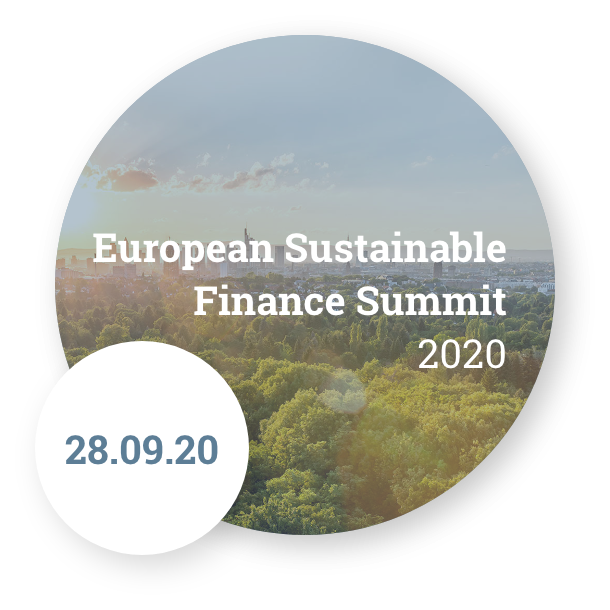European Sustainable Finance Summit 2020

Am 28. September 2020 findet unser vierter Sustainable Finance Summit statt und vor dem Hintergrund der aktuellen EU-Präsidentschaft Deutschlands erstrahlt er in diesem Jahr im europäischen Licht. Gut so, denn die Etablierung nachhaltiger Finanzstrukturen wird uns nur gemeinsam gelingen!
Unter der Schirmherrschaft des Bundesfinanz- und des Bundesumweltministeriums freut sich das GSFCG e. V. auf prominente Key Note Speaker, hochkarätig besetzte Panels und Workshopformate, die angeleitet durch Expert:innen zur Diskussion und Vertiefung einladen. Die Veranstaltung findet in diesem Jahr im digitalen Format statt und richtet sich wie immer an interessierte Vertreter:innen aus Finanzbranche, Realwirtschaft, Politik, Wissenschaft und Zivilgesellschaft.
ESFS Livestream
Agenda
Welcome
- Tarek Al Wazir – Minister for Economic Affairs, Energy, Transport and Housing – State of Hessen
Opening Address
- Olaf Scholz – Federal Minister Of Finance
- Svenja Schulze – Federal Minister for the Environment, Nature Conservation and Nuclear Safety
- Sanna Eriksson – OP Mortgage Bank
- Marcel Haag – European Commission
- Jörg Kukies – Federal Ministry of Finance
- Thomas Kusterer – EnBW
- Christian Sewing – Deutsche Bank
- Nicholas Stern – London School of Economics
- N.N. – [Real Economy]
Content: discussion of key aspects of financing sustainable growth at EU and national levels. Keynote (20 minutes) followed by panel discussion (50 minutes) and open debate with audience (50 minutes).
12.30 Lunch break
13.30 Workshops
Speaker
- Christoph Bals (Germanwatch)
- Thomas Kusterer (EnBW)
- Michèle Lacroix (Scor)
- Christian Thimann (Athora)
Moderator
- Lothar Rieth (EnBW) – SFB
Guiding Questions
- What regulation is required to enable TCFD- information be processed effectively on financial markets, also in light of the requirements of the Disclosure Regulation for Financial Institutions?
- How to push the envelope in terms of published information in light of competition? What could be the role of external auditors?
- What is required to achieve added value of scenario analyses? What are key steps to achieve comparability?
- What is European best practise?
Speaker
- Anna Breman (Sveriges Riksbank)
- Frank Pierschel (BaFin)
- Pamela Schuermans (EIOPA)
Moderator
- Kristina Jeromin (GSFCG, SFB)
- Matthias Kopp (SFB)
Guiding Questions
- What is the role of central banks and supervisory authorities in mainstreaming Sustainable Finance? How well do central banks and supervisory authorities live up to that role?
- What approaches are available to central banks and supervisory authorities to incorporate sustainable finance into their activities and to re-shape financial market (actors‘) behaviour?
Speaker
- Jürgen Kern (KfW)
- Johanna Köb (Zurich Insurance Company)
- Karl-Oskar Olming (SEB)
- Rüdiger Rass (Commerzbank)
Moderator
- Dustin Neuneyer (PRI)
Guiding Questions
- What are the key challenges in integrating sustainability risk (outside in) in existing risk management systems and tools?
- What approach do you follow to integrate impact target setting and progress reporting? What value do you see in collaboration with other FIs vs. individual efforts?
- How do you manage to close data gaps (material sustainability data), wrt large portfolios / SME clients / investee companies? What role to you assign active dialog strategies, where do you see synergies?
- What sense do you see in joint learning approaches? Do you see cross learning benefits across finance sectors (e.g. banking and insurance)?
- Your three key asks for adjustments to regulatory frameworks to ensure speedy scale up for “industrialisation” of net-zero/ sustainability target frameworks?
Speaker
- Jean-Jacques Barberis (Amundi)
- Susanne Knöfel (DG JUST, European Commission)
- Simone Menne (non-executive director BMW, Deutsche Post DHL, Johnson Controls)
- Prof. Wolf-Georg Ringe (Universität Hamburg)
Moderator
- Michael Schmidt (Lloyd Fonds, SFB)
Guiding Questions
- Are today’s requirements on executive and non-executive directors (in laws and regulations or in self-regulatory standards like Corporate Governance Codes) sufficient to achieve sustainability goals as defined by the SDGs and the Paris climate agreement?
- Does sustainability play an adequate role in practice, in the proceedings and workings of a board of directors?
- Where are the sustainability gaps in director duties and on boards of directors: in the selection process of directors and their profiles of skills and expertise; in the composition of the board, its incentive system and its modus operandi?
- How should the sustainability gaps be best addressed: by an EU Statement of Director Duties; by national laws and regulations; by self-regulatory standards?
- Should requirements on directors differ between companies of the real economy and the financial sector?
Speaker
- Sven Giegold (MEP)
- Ann-Cathrine Husson-Traore (Novethic)
- Christian Klein (Universität Kassel)
Moderator
- Georg Schürmann (Triodos Bank, SFB)
Guiding Questions
- What will be the added value of a sustainability risk product classification system?
- What is the relation to the EU Ecolabel and the EU Taxonomy?
- How to avoid overburdening those who offer financial products?
Speaker
- José Luis Blasco (Acciona)
- Kirsten Häger (State of North Rhine-Westphalia, MoF)
- Marcus Pratsch (DZ Bank)
- Martin Spolc (European Commission)
Moderator
- Karsten Löffler (GSFCG, SFB)
- Yannick Motz (GIZ)
Guiding Questions
- Do we actually need a European Green Bond standard?
- Will the EU GBS become tomorrow’s standard? What are key issues to resolve under the EU GBS for issuers? What is the view of institutional investors?
- How to put the recommendations by the TEG that reference to the (analoguous) use of the EU Taxonomy into practice?
- What are key issues for evolution of the EU GBS into a EU Sustainability Bond Standard, including social?
Speaker
- Anna Braune (DGNB e.V. – German Sustainable Building Council)
- Rufus Grantham (Bankers without Boundaries)
- Rupesh Madlani (Bankers without Boundaries)
- Mario Motta (Politecnico di Milano)
Moderation
- Ulrike Linnig (EIC Climate-KIC)
- Felicity Spors (EIC Climate-KIC)
Guiding Questions
- What is the typical business model for retrofit, and why is there an investment barrier?
- What examples are there for overcoming this barrier – and how is the business model different?
- What lessons can we take forward?
- Finance will not solve all the barriers -what else needs to be addressed?
- Recommendations on finance and ideas for developing blue print models to address place based barriers.
15.00 Coffee break
- Isabel Schnabel – European Central Bank (keynote)
- Peter Blom – Triodos Bank
- Lutz Diederichs – BNP Paribas
- Jordi Gual – CaixaBank
- Sabine Mauderer – Deutsche Bundesbank
Content: discussion of banking supervision and risk management approaches with regard to climate risks. Keynote (20 minutes) followed by panel discussion (50 minutes) and open debate with audience (50 minutes).
Kristina Jeromin & Karsten Löffler – Green and Sustainable Finance Cluster Germany










